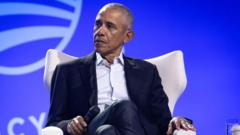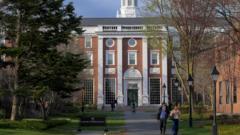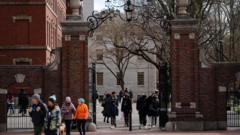Former President Barack Obama has voiced strong criticism against President Donald Trump's recent actions involving federal funding for Harvard University, positioning himself firmly in defense of academic freedom.
Obama Slams Trump's Funding Freeze for Harvard as 'Unlawful'

Obama Slams Trump's Funding Freeze for Harvard as 'Unlawful'
Barack Obama's reaction to Trump's funding freeze highlights the tension between universities and governmental demands.
Former President Barack Obama is breaking his silence on the Trump administration’s controversial maneuver to freeze over $2 billion in federal funding for Harvard University, after the institution refused to comply with demands regarding its policies on hiring, admissions, and teaching. Obama, an alumnus of Harvard Law School, described this funding freeze as "unlawful and ham-handed," offering his support to Harvard's decision to uphold its longstanding commitment to academic integrity.
In a public statement on social media, Obama encouraged other universities to adopt similar stances, emphasizing that Harvard has set a benchmark for academic institutions by resisting government pressure that infringes on academic freedom. His remarks were significant as they mark the first time since Inauguration Day that he has made a pointed critique of the Trump administration.
Over recent months, the Trump administration has exerted pressure on various universities, particularly elite ones, to conform to specific policies that the administration claims will address antisemitism on campus. These pressures come as part of a broader narrative surrounding academic institutions and their roles in fostering an environment of free inquiry. In his message, Obama asserted that "no government – regardless of which party is in power – should dictate what private universities teach or whom they hire."
Support for Harvard’s resistance is growing, with many faculty members from Yale University voicing their solidarity in a published letter. They highlighted that the challenges facing American universities threaten essential democratic principles, including free expression and academic freedom. Other institutions, like the Massachusetts Institute of Technology (MIT), have also echoed Harvard’s defiance against the federal government’s overreach.
Despite this, Trump has remained firm in his position, threatening to revoke Harvard’s tax-exempt status—a critical financial resource that allows many educational institutions to operate. Trump's administration had taken similar actions against Columbia University recently, demanding compliance while freezing funding.
As the debate over federal funding for universities continues to brew, the ongoing standoff encapsulates a significant moment in the intersection of education and policy-making in the United States.
In a public statement on social media, Obama encouraged other universities to adopt similar stances, emphasizing that Harvard has set a benchmark for academic institutions by resisting government pressure that infringes on academic freedom. His remarks were significant as they mark the first time since Inauguration Day that he has made a pointed critique of the Trump administration.
Over recent months, the Trump administration has exerted pressure on various universities, particularly elite ones, to conform to specific policies that the administration claims will address antisemitism on campus. These pressures come as part of a broader narrative surrounding academic institutions and their roles in fostering an environment of free inquiry. In his message, Obama asserted that "no government – regardless of which party is in power – should dictate what private universities teach or whom they hire."
Support for Harvard’s resistance is growing, with many faculty members from Yale University voicing their solidarity in a published letter. They highlighted that the challenges facing American universities threaten essential democratic principles, including free expression and academic freedom. Other institutions, like the Massachusetts Institute of Technology (MIT), have also echoed Harvard’s defiance against the federal government’s overreach.
Despite this, Trump has remained firm in his position, threatening to revoke Harvard’s tax-exempt status—a critical financial resource that allows many educational institutions to operate. Trump's administration had taken similar actions against Columbia University recently, demanding compliance while freezing funding.
As the debate over federal funding for universities continues to brew, the ongoing standoff encapsulates a significant moment in the intersection of education and policy-making in the United States.























